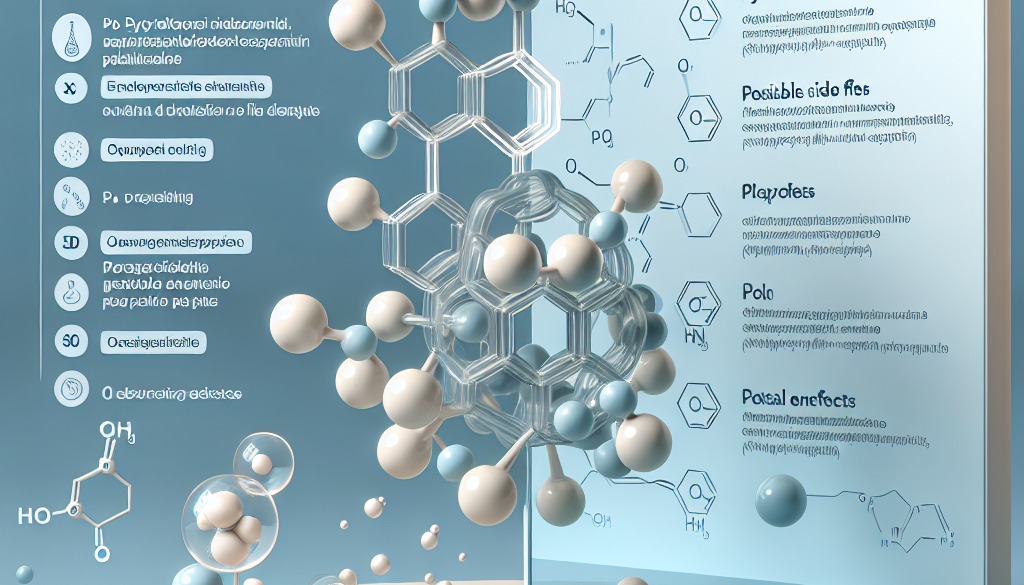Side Effects of PQQ: Explained
-
Table of Contents
- PQQ Side Effects: A Comprehensive Analysis
- Understanding PQQ
- Reported Side Effects of PQQ
- Understanding the Research
- Case Studies and Anecdotal Evidence
- Interactions with Medications and Other Supplements
- Recommended Dosages and Safety Precautions
- Conclusion: Balancing Benefits and Side Effects
- Discover ETChem’s Protein Products
PQQ Side Effects: A Comprehensive Analysis

Pyroloquinoline quinone (PQQ) is a compound that has gained attention for its potential health benefits, including its role in cellular metabolism and neuroprotection. However, as with any supplement, it is crucial to understand the possible side effects associated with its use. This article delves into the side effects of PQQ, providing a well-researched and informative perspective for those considering its supplementation.
Understanding PQQ
Before discussing the side effects, it is important to understand what PQQ is and its purported benefits. PQQ is a small quinone molecule that acts as a REDOX agent, capable of reducing oxidants (an antioxidant effect) and then being recycled back to its active form by glutathione. It is found in various foods such as kiwifruit, green peppers, parsley, and human breast milk. PQQ is also thought to play a role in supporting mitochondrial function, which is crucial for energy production and overall cellular health.
Reported Side Effects of PQQ
While PQQ is generally considered safe, some individuals may experience side effects. It is important to note that the research on PQQ is still emerging, and more studies are needed to fully understand its safety profile. The following are some reported side effects:
- Gastrointestinal Discomfort: Some users report mild gastrointestinal issues such as bloating, gas, and abdominal pain.
- Headaches: A small number of individuals have experienced headaches after taking PQQ supplements.
- Insomnia: Due to its potential effects on energy levels, PQQ may cause difficulty sleeping if taken later in the day.
- Fatigue: Ironically, while PQQ is known for boosting energy, some people may feel fatigued as their bodies adjust to the supplement.
- Allergic Reactions: As with any supplement, there is a risk of allergic reactions, which could manifest as skin rashes or other symptoms.
Understanding the Research
Most studies on PQQ have been conducted on animals or in vitro, with a limited number of human trials. The existing research suggests that PQQ is well-tolerated by humans at doses up to 20 mg per day. However, the long-term effects and the side effects at higher doses are not well-documented.
Case Studies and Anecdotal Evidence
Case studies and anecdotal reports can provide additional insights into the side effects of PQQ. While these sources are not as reliable as controlled studies, they can highlight potential issues that warrant further investigation. For example, anecdotal evidence from online forums and product reviews may point to side effects not captured in clinical trials.
Interactions with Medications and Other Supplements
PQQ may interact with certain medications and other dietary supplements. For instance, its antioxidant properties could potentially alter the effectiveness of chemotherapeutic drugs. Additionally, combining PQQ with other supplements that affect mitochondrial function, such as CoQ10, may lead to unexpected effects. It is always recommended to consult with a healthcare provider before starting any new supplement regimen.
Recommended Dosages and Safety Precautions
The appropriate dosage of PQQ may vary based on individual factors such as age, health status, and the presence of any medical conditions. Most studies have used dosages ranging from 10 to 20 mg per day. To minimize the risk of side effects, it is advisable to start with a lower dose and gradually increase it if necessary. Additionally, purchasing supplements from reputable sources and checking for third-party testing can help ensure product quality and safety.
Conclusion: Balancing Benefits and Side Effects
In conclusion, while PQQ offers promising health benefits, it is essential to be aware of its potential side effects. Most individuals tolerate PQQ well, but some may experience adverse reactions. By understanding the research, considering anecdotal evidence, and taking appropriate precautions, users can make informed decisions about incorporating PQQ into their health regimen.
Discover ETChem’s Protein Products
If you’re looking for high-quality protein products, consider exploring ETChem’s offerings. ETChem is a reputable manufacturer and supplier of various types of collagen, catering to different industries. Their products are known for their neutral taste and instant solubility, making them an excellent choice for your protein needs.
About ETChem:
ETChem, a reputable Chinese Collagen factory manufacturer and supplier, is renowned for producing, stocking, exporting, and delivering the highest quality collagens. They include marine collagen, fish collagen, bovine collagen, chicken collagen, type I collagen, type II collagen and type III collagen etc. Their offerings, characterized by a neutral taste, instant solubility attributes, cater to a diverse range of industries. They serve nutraceutical, pharmaceutical, cosmeceutical, veterinary, as well as food and beverage finished product distributors, traders, and manufacturers across Europe, USA, Canada, Australia, Thailand, Japan, Korea, Brazil, and Chile, among others.
ETChem specialization includes exporting and delivering tailor-made collagen powder and finished collagen nutritional supplements. Their extensive product range covers sectors like Food and Beverage, Sports Nutrition, Weight Management, Dietary Supplements, Health and Wellness Products, ensuring comprehensive solutions to meet all your protein needs.
As a trusted company by leading global food and beverage brands and Fortune 500 companies, ETChem reinforces China’s reputation in the global arena. For more information or to sample their products, please contact them and email karen(at)et-chem.com today.




